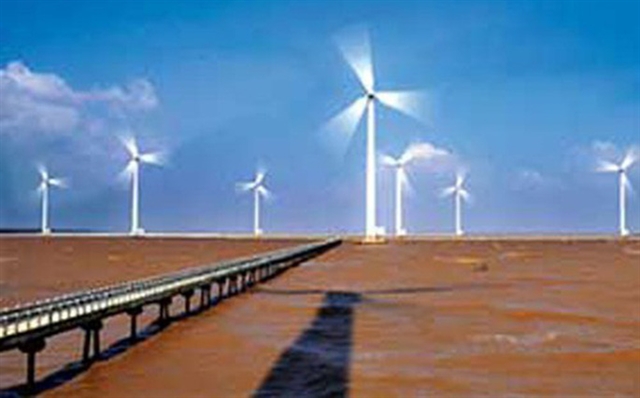Experts forecast Viet Nam’s wind power sector would further grow in line with the Government’s stronger regulatory support announced recently and rising investor interest, which has strengthened the project pipeline.

Experts forecast Viet Nam’s wind power sector would further grow in line with the Government’s stronger regulatory support announced recently and rising investor interest, which has strengthened the project pipeline.
According to experts from the international financial information provider Fitch Solutions, the Government has proposed several policies in recent months to boost the development of the wind sector, in particular offshore wind, which bodes well for the industry.
“We note that Viet Nam contains one of the highest potentials for wind power in the region, as it is endowed with high wind speeds particularly in the offshore or near-shore areas,” Fitch experts said.
The Ministry of Industry and Trade (MoIT) estimates this potential to be at approximately 475GW. The Prime Minister issued a resolution in March 2020 for a five-year plan to 2025 to develop renewable energy sources ‘off the coast’, with specific mechanisms and policies to attract both foreign and local developers to invest in the sector.
The offshore wind sector was also emphasised under the National Energy Development Strategy of Viet Nam to 2030, and the MoIT has proposed to include several wind projects in the upcoming Power Development Plan. The Government is also in the process of amending seabed lease and licensing requirements for large-scale offshore wind farms, alongside the Ministry of Natural Resource and Environment (MoNRE).
In contrast to Viet Nam’s approach toward its solar sector, the MoIT has also proposed to extend the feed-in-tariff (FiT) deadlines for wind by two years, from the original commercial operation date (COD) deadline in November 2021 to the end of 2023, before implementing auctions thereafter. The current FiT for offshore wind is highly attractive at 9.8 US cents per kWh, which was increased from the previous rate of 7.8 US cents per kWh.
This extension follows appeals from several wind energy developers, industry associations and local governments from nine provinces after the COVID-19 outbreak has caused some near-term headwinds to the sector. This is largely due to project delays stemming from supply chain disruptions, labour shortages, and construction being forced to stop temporarily due to the COVID-19 outbreak, as well as delays to several wind project approvals.
“We believe that the more amenable approach the Government is taking to the wind sector when compared to the solar sector is because growth to date has been at a more manageable pace for the system to cope with, given that the development or wind projects are typically longer and more complicated. This also occurs against a broad support for renewable energy in general, particularly as Viet Nam is set to see a surge in power demand, which offers capacity growth opportunities for the sector,” the experts said.
Fitch expects the Government to announce a new Power Development Plan VIII this month with renewable energy to likely see a greater focus.
Capacity targets for the country’s wind sector are expected to increase to 6GW by 2025 and 10GW by 2030, from the existing targets of 2GW and 6GW respectively. The Government is also looking to introduce a new Direct Power Purchase Agreement (DPPA), where renewable energy producers can sell and deliver electricity directly to corporate customers.
“We believe these developments will encourage further growth and investment in the sector. We have already seen growing investor interest across Viet Nam's wind sector over the past year, which has strengthened the pipeline significantly,” Fitch said. — VNS
- Tags
- wind power sector
- Vietnam





